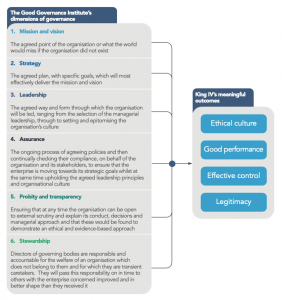What is the value of a board?
16 April 2020

During the pandemic boards have stepped back so that executive teams can focus on the here-and-now crisis. NHS Boards are chosen for their expertise and are the controlling mind of their enterprise. The future of the organisation they serve is in their hands.
Many of the rituals of board governance have been abandoned or at least suspended. As some sort of normality returns, good boards will be thoughtful about their purpose and about what added value governance should bring to the enterprise.
Starting point: what is governance?
Governance is not to be confused with simple business efficiency, democracy, social science or populism. This is key in public sector services where those directing an organisation may have been selected through election rather than appointment. Governance, with its emphasis on evidence-based decisions by a defined ‘controlling mind’ of individuals selected for their skills and experience, is the flip side of populism.
Governance is not a system defined by ‘doing what people want or think best’ but rather one that carries a specific responsibility to maximise the chance of the organisation’s aims being achieved while at the same time having duties towards all of that organisation’s stakeholders. For public services, those stakeholders include government, the taxpayer, regulators, staff, citizens, business and public sector partners, banks, creditors and competitors. Accordingly, governance is usefully defined as ‘permission to govern’. Good governance is not about ownership, it is about stewardship.
GGI has found the work of the King Commission into corporate governance an invaluable authority on good governance. Since 1994, the King Commission has published four major reports, the latest being King IV in 2016. GGI believes that applying the King IV approach will support NHS organisations to improve their governance arrangements and, as a result, deliver effectiveness and demonstrate compliance with regulatory requirements.
King IV’s objectives are to:
- promote corporate governance as integral to running an organisation and delivering governance outcomes such as an ethical culture, good performance, effective control and legitimacy
- reinforce corporate governance as a holistic and interrelated set of arrangements to be understood and implemented in an integrated manner
- encourage transparent and meaningful reporting to stakeholders
- present corporate governance as concerned with not only structure and process, but also with an ethical consciousness and conduct
- broaden the acceptance of the King IV by making it accessible and fit for implementation across a variety of sectors and organisational types.
Dimensions of governance and meaningful outcomes
In the sense that governance is what governing bodies do, the Good Governance Institute has identified six dimensions which lead to King IV’s four meaningful outcomes of good governance.
GGI contends that the dimensions of governance and King IV’s meaningful outcomes are key to understanding governance because they frame a thoughtful and useful approach to running complex public sector organisations.
King III placed great emphasis on leadership, sustainability and corporate citizenship and these remain critical. King IV brings the model to maturity by defining corporate governance as the exercise of ethical and effective leadership by the governing body towards the achievement of four governance outcomes:
- ethical culture
- good performance
- effective control
- legitimacy
The new model helps organisations maintain a simple focus on practice delivering outcome by defining a set of principles to guide them on what they should set out to achieve. These principles are achieved by mindful consideration and application of the recommended practices.
The following diagram describes this cause-and-effect model.

This approach rejects the governance for governance’s sake mantra of the governance industry. We believe that good governance provides clear and apposite benefits, as well as a high-level and practical governance framework for those charged with being responsible for an organisation.
As boards re-group in the coming weeks with talk of ‘returning to normal’ (or more usefully, asking ‘what is the new normal?’) they should be focused on their added value and the achievement of meaningful outcomes, and then look to what process will deliver these.
Call to action
This series will start to pick up the theme of recovery as our NHS moves into the next phase of this crisis, which we see as the flattening of the COVID-19 curve. But ahead of us lies at least a further year of life and service operation within the context of a global pandemic and economic recession.
During this new phase, GGI will continue to provide advice about modern, strengthened and proportionate governance and how it can add value to health and social care organisations. Our goal is to ensure that at this difficult time an ethical culture, good performance, effective control and legitimacy are all hallmarks of the organisations we work with.
GGI would like to hear your perspective and experiences on the COVID-19 crisis. If you have any questions or comments about this briefing, please call us on 07732 681120 or email advice@good-governance.org.uk and we will aim to respond within 24 hours.

